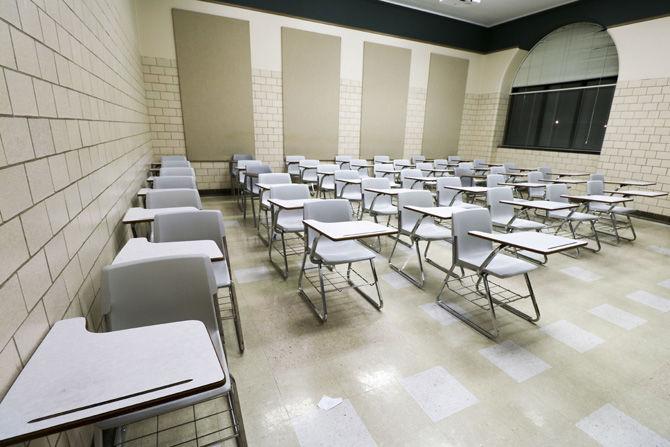Either by choice or by LSU’s Roadmap to Fall regulations, many students are experiencing an entirely online-based college experience this semester. Some have opted to move back home, and some have remained around campus.
At the beginning of the fall 2020 semester, LSU announced that classes of 100 or more students will be held online, with few exceptions. Classes of 11-99 have the option to be in person, either by holding the class in a large room or with alternating in-person attendance days. Classes of ten or fewer students will be held as usual, unless the faculty member has arranged otherwise.
Media Director Ernie Ballard said there has not been a substantial change in class formats since the start of the semester. Approximately 33% of classes are in person, 33% are fully online and 33% are hybrid.
Business sophomore Jordan Harrison lives in an apartment around campus, but all five of her classes are online. So far, her experience has not been positive.
“I have no connection to campus,” Harrison said.
Harrison said online learning has been challenging for her because she’s an auditory learner and many of her professors forgo lectures and instead assign textbook chapters or readings. She said there’s much less professor-student interaction than in a usual classroom setting.
“I do have to say that LSU has handled it pretty well as an organization, but the teachers themselves haven’t handled it as well as I would have liked them to,” Harrison said.
Some students have reported that professors suddenly change due dates or add extra assignments without warning, making it difficult for students to keep track of their classes and stay organized.
“I don’t understand how this is okay,” Harrison said. “Some of my teachers just change dates of assignments and [don’t] let anyone know, whereas if we were in person they wouldn’t do that because the class would uproar. I’ve definitely found not that I can’t keep track [of assignments], but that the teachers make it difficult to keep track.”
Political science junior Kalie Gonzales experienced a similar situation with one of her professors who added new assignments and changed due dates without alerting the students.
After finding that all her classes would operate remotely, Gonzales relocated to New Mexico for the semester to complete her coursework and save money on housing. Although it wasn’t her first choice, she said that this experience has “helped me find myself a little more.”
Gonzales said it’s difficult to stay on top of classes because professors handle online teaching in drastically different manners. Some classes have live Zoom calls while some are asynchronous. Some tests are open book, while others are on ProctorU. Some teachers assign extra quizzes, while others don’t have any.
“I’ve been trying really hard, but sometimes you just miss things,” Gonzales said. “I think if we have to do this again, they need to set specific guidelines for teachers.”
Criminology sophomore Tyler Machen moved home to Prairieville for the semester because all of his classes are online.
“It really hasn’t been too bad,” Machen said.
Machen said at times understanding material without direct contact with professors is challenging, but the majority of his experience has been positive. Machen said he is not receiving the same quality of education as when classes were in person.
For many, this raises the question: why are students paying higher tuition rates for an online education with decreased learning quality?
African and African American studies sophomore Kaya Lewis said she doesn’t understand.
“It would be one thing paying the same [tuition], but having to pay more when you can’t use any of the campus facilities or resources is annoying,” Lewis said.
For safety and financial reasons, Lewis decided to remain off campus for the duration of the semester. She currently resides in South Dakota.
“There’s a lot that LSU gives you, but when you’re off campus and online, you don’t have any of that,” Lewis said.
Harrison echoed Lewis’ frustration.
“When you aren’t even in person and don’t have the access to all the amenities on campus, it’s like, how can you justify charging us that much?” Harrison said. “Especially because of COVID, a lot of families are struggling financially. To assume that those students are in the same position they used to be is kind of crazy to me.”








